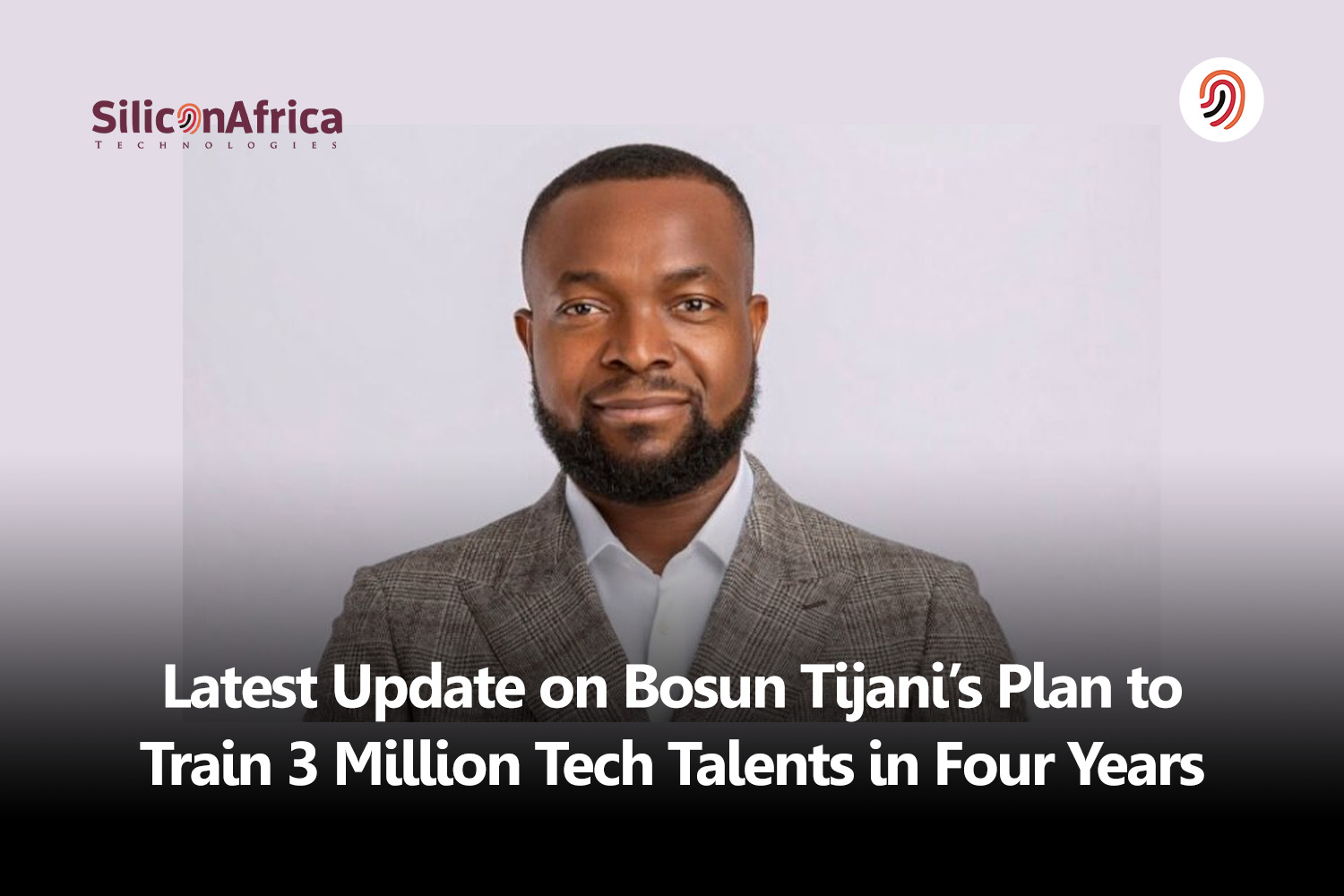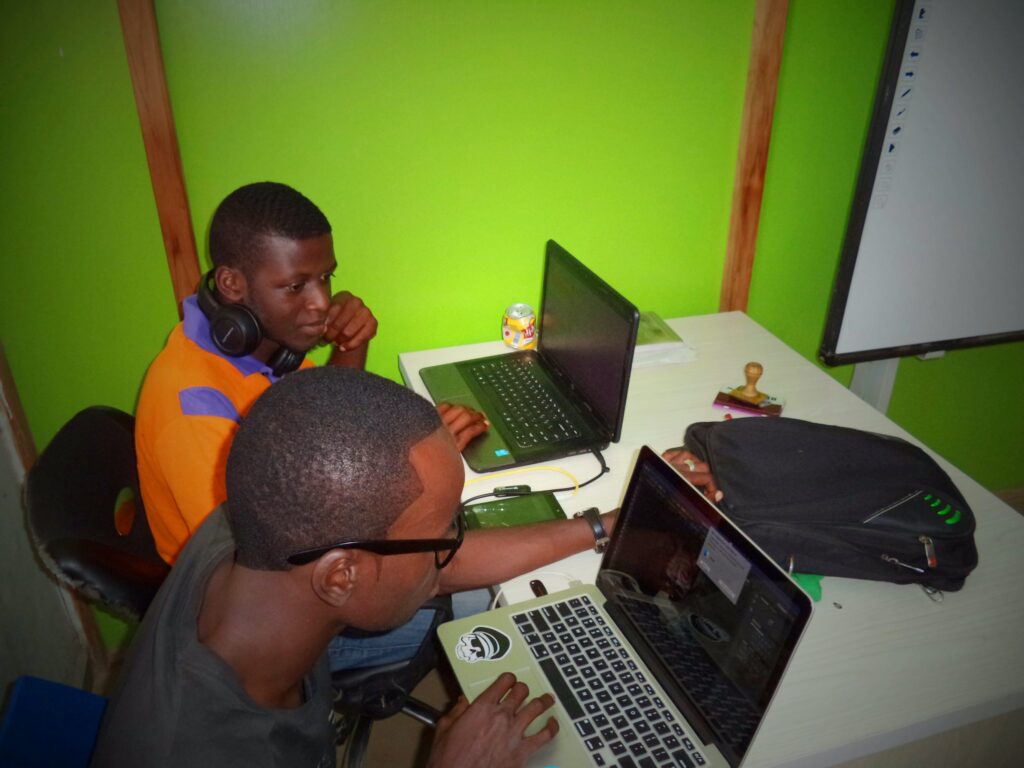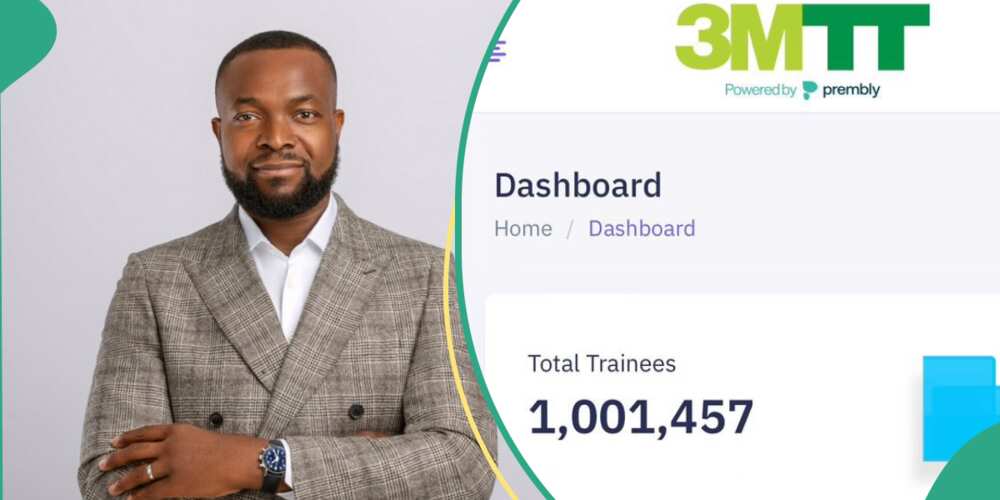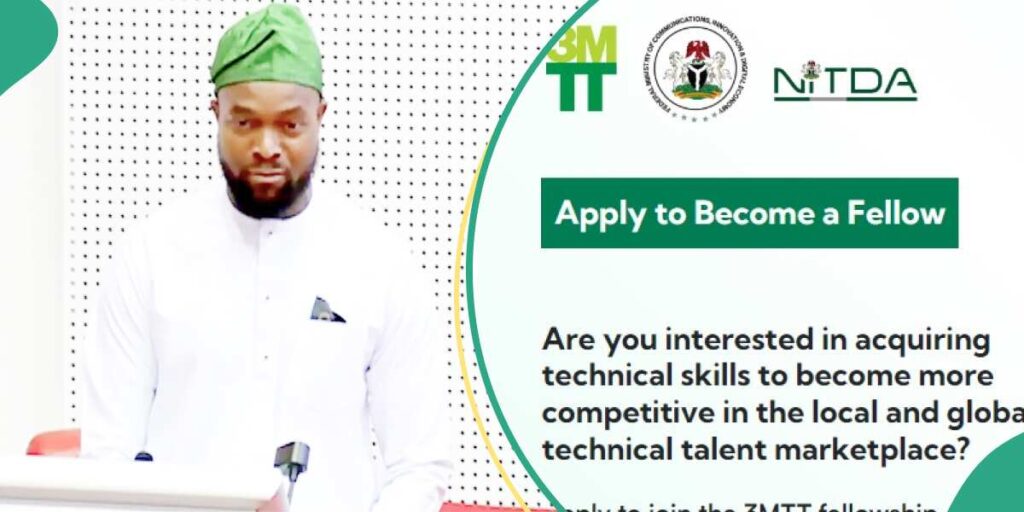Physical Address
60 Ekwema Cres, Layout 460281, Imo
Physical Address
60 Ekwema Cres, Layout 460281, Imo

Bosun Tijani, Nigeria’s minister of communications, innovation, and digital economy, has explained how his ministry plans to train three million tech talents over the course of the next four years.
On Wednesday, October 11, Bosun Tijani claimed the ministry had developed a special model to guide the implementation of the strategy.
“The model we’re employing is 1-10-100. For the first three months, we will begin with 1% of our 3 million target. And thirty thousand people will make up that one percent. Therefore, applications for fellows and trainers will be available starting this Friday.”
The minister also said that the 30,000 individuals would be divided up according to the population and economic activities of each state in Nigeria. Bosun Tijani formally announced the Federal Ministry of Communications, Innovation & Digital Economy’s (3MTT) three million technical talent training project by 2027 (FMCIDE).
In order to bridge the skills gap in the global workforce and support President Tinubu in realizing his ambition of creating two million digital jobs in his first two years in office. A technical talent pipeline across Nigeria is intended to be established.
With an estimated 40.6% unemployment rate in Nigeria, 3MTT programme is a positive move.
Read also – The SASSA status check 2024/2025

According to Bosun Tijani, the 3MTT programme will be implemented in three stages, in accordance with the FMCIDE’s 1%-10%-100% implementation plan.
Phase One (Prototyping) will train 30,000 technical talent, or 1% of the entire objective, over the course of three months with 72 hours of instruction.
The remaining stage, scaling, will make up the remaining 10% of the three million fellows.
The next phase, piloting, will accept more applications, totaling 300,000 fellows.
Read also – How to use MTN MoMo in South Africa 2024
In 3MTT, there are four parties engaged.

1.52 million people applied between Friday, October 13, 2023, when phase one applications opened, and when they closed less than a month later. Kano led the application pool as the state with the most entries, with a record 162,750.
Lagos received 87,108 applications, ranking third. Just 432,920 women applied, compared to 1,090,060 men who did so. Out of the 1.52 million applicants, 524,956 were jobless, and 468,968 were students.
This left 520,000 fellows who were self-employed, part-time workers, or full-time employees. Moreover, only 120 training providers were accepted within the program’s initial phase.
FMCIDE will appoint training providers on a rolling basis, with verification continuing. Those who were not accepted into phase one may be admitted into subsequent phases.
According to Bosun Tijani, phase one of the 3MTT programme will focus on these 12 technical skills:
Software Development is the most requested course in phase one, with 353,189 applications. Cybersecurity (286,471) and Product Management (268,996) come in close second and third, respectively.
Read also – Upgrade Your Health Business with VULTe this New Year
The Ministry will not reimburse fellows for expenses incurred outside training, nor will it give them laptops. During the programme, participants will bear the cost of their own food, transportation, and other expenditures.
Nonetheless, the Ministry will collaborate with partners to offer internship opportunities and assistance in securing financing for laptop purchases. As an illustration, NITDA and UNDP Nigeria are collaborating to provide trainees in the 3MTT programme with 3,000 paid internship opportunities.

Hybrid learning received phase one approval from the FMCIDE.
On December 4, 2023, fellows in this phase started their education.
The programme will combine self-paced, structured online learning from a few chosen training providers with weekly meetings where fellows will meet with training partners to put their newly acquired knowledge into practice.
Over the course of three months, fellows must dedicate a total of 72 hours to learning. 74 local government areas in 16 states, including the FCT, will host in-person gatherings for fellows taking the same course during this prototype phase.
These clusters, or small learning groups, will be part of the 3MTT programme learning community. Fellows will get access to community administrators and mentors in addition to the structured online content and in-person gatherings.
In order to support and assist those who were not accepted into phase one of the 3MTT programme, these clusters will also be available to them. However, it’s unclear how the FMCIDE intends to incorporate them into the clusters without obstructing the fellows’ advancement.
Hopefully, as the program’s first phase goes on, this will become more apparent.
Read also – Meet New Access Holding Interim CEO, Bolaji Agbede
Over the next 20 years, artificial intelligence, according to Mr. Bosun Tijani, will bring in a new era of technological and economic change.
“We must develop a comprehensive national policy to responsibly and inclusively utilize the promise of artificial intelligence as an emerging economy.
In light of this, we are employing a novel way to offer the knowledge and viewpoints required to develop an ambitious plan. He continued by saying that among other things, the strategy’s implementation is anticipated to make Nigeria one of the world’s top 10 destinations for AI model training and skill.
Furthermore, we intend to establish Nigeria as a worldwide frontrunner in expediting inclusion inside AI datasets.
According to Mr. Bosun Tijani, the strategy calls for creating over 50,000 jobs in Nigeria’s AI industry by 2030 as well as ranking in the top 50 globally (now 96) for AI readiness and adoption across parameters (Computing Power, Skills, Data Availability, Ethics, and Governance).
He clarified that in today’s digital age, data has emerged as a crucial component for value creation and economic change.
He did note that there is a risk of data breaches and misuse due to the large-scale data exchange that occurs inside the data economy value chain.
We will oversee the revision and execution of the Nigeria Open Data Policy, which grants the general public unrestricted access to non-sensitive public sector data in order to foster innovation, enhance public participation and service delivery, facilitate value generation, and open up economic
While the Bosun Tijani`s goal of equipping 3 million Nigerians with tech skills in four years is bold and laudable, several significant challenges threaten its viability.
Understanding these hurdles is crucial for assessing the initiative’s potential success and informing strategies to overcome them.
The cost of training millions in the 3MTT programme is substantial. Infrastructure, training materials, instructors, and stipends for participants add up quickly.
While the government has allocated some funds, reaching the full scale might require public-private partnerships or innovative financing mechanisms.
Attracting private investment hinges on the program’s effectiveness and its potential to generate economic returns. However, uncertainty due to the program’s nascent stage could deter investors.
Nigeria faces a significant digital divide, with large chunks of the population lacking access to reliable internet and devices. The program’s effectiveness relies heavily on online learning platforms and resources.
This raises concerns about excluding those without access, exacerbating existing inequalities and jeopardizing the program’s inclusivity.
Addressing this requires substantial investment in expanding internet infrastructure, distributing subsidized devices, and exploring offline learning alternatives.
Read also – How to Transfer airtime on MTN in South Africa
The rapid evolution of technology demands training that focuses on in-demand skills and adaptable problem-solving abilities.
While the program identifies essential areas like software development and data analysis, staying current with industry trends and tailoring training to specific sectors remain key challenges.
Partnering with tech companies, adopting flexible curriculum models, and incorporating industry feedback are crucial to ensure graduates possess relevant and marketable skills.
Training alone is insufficient. The program’s success hinges on retaining trained individuals within the ecosystem and creating job opportunities for them.
This requires fostering an enabling environment. Streamlining the certification process, promoting tech startups, and incentivizing companies to hire local talent are crucial.
Additionally, addressing brain drain by facilitating remote work opportunities and ensuring competitive salaries within Nigeria are essential for long-term sustainability.
Managing such a large-scale initiative efficiently is vital. Implementing effective governance structures, robust monitoring and evaluation mechanisms, and transparent communication processes are crucial.
Collaborating with relevant stakeholders, NGOs, and educational institutions can leverage expertise and ensure smooth program execution.
Additionally, establishing clear accountability and performance metrics will be vital for tracking progress and making necessary adjustments.
Nigeria’s socio-economic disparities can hinder equal access to the program. Factors like gender, income levels, and geographical location can disadvantage certain groups.
Addressing these requires targeted outreach initiatives, scholarships, and flexible learning formats that cater to diverse needs.
Inclusive training materials and instructor diversity are also important to foster a welcoming environment for all participants.
While technical skills are vital, soft skills like communication, teamwork, and critical thinking are equally important for career success.
Integrating these skill development elements into the program and fostering collaboration with entrepreneurship initiatives can ensure graduates are well-rounded and prepared for the demands of the workplace.
The global tech landscape is constantly evolving, and unforeseen challenges, such as economic downturns or technological disruptions, may arise.
Building program flexibility and incorporating agility into training models will be crucial to adapt to changing circumstances and ensure the program remains relevant and effective.
Bosun Tijani is the Nigeria’s minister of communications, innovation, and digital economy.
Eligibility details are still evolving, but the program typically targets Nigerian citizens with basic qualifications and an interest in technology.
The initial phases focus on 12 key areas like software development, data analysis, cybersecurity, and UI/UX design. Future phases may expand to include other relevant skills.
The duration varies depending on the specific skill and chosen program format. Some courses may be short and intensive, while others might last for several months.
No, there is no guaranteed job placement. However, the program aims to equip graduates with in-demand skills and may offer career support services.
Applications typically happen through the official website (https://3mtt.nitda.gov.ng/). Stay tuned for updates on application deadlines and procedures.
The program is exploring options for alternative learning methods, including offline materials and partnerships with learning centers. Stay informed through official channels for updates.
Partnerships with industry experts, regular curriculum updates, and feedback mechanisms are planned to maintain alignment with market needs and ensure high-quality training.
The program aims to foster a supportive ecosystem for tech professionals in Nigeria by promoting entrepreneurship, competitive salaries, and remote work opportunities.
The ambition of the 3 Million Tech Talent 3MTT programme is immense, and the challenges are undeniably complex.
However, by acknowledging these hurdles and proactively addressing them through innovative solutions, collaboration, and a commitment to inclusivity.
Nigeria can move towards its goal of creating a generation of tech-savvy individuals who drive economic growth and contribute to the nation’s digital transformation.
Bosun Tijani, the minister of communications, innovation, and digital economy, revealed the strategy in the ministry’s 31-page “Accelerating our Collective Prosperity through Technical Efficiency” Strategic Blueprint paper.
According to Mr. Bosun Tijani, the ministry’s dedication to developing talent is steadfast.